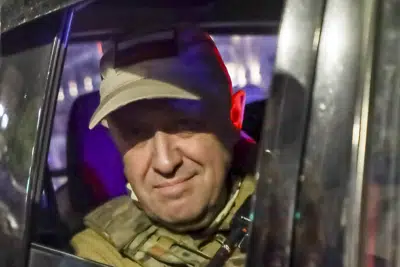ROSTOV-ON-DON/VORONEZH, Russia(Reuters) – Heavily armed Russian mercenaries, known as the Wagner group, have retreated from the southern Russian city of Rostov as part of a deal aimed at halting their advancement towards Moscow. While the withdrawal temporarily eases the immediate crisis, it raises uncertainties regarding President Vladimir Putin’s hold on power.
The mutinous Wagner fighters, under the leadership of Yevgeny Prigozhin, have returned to their bases after reaching an agreement that guarantees their safety. As part of the deal mediated by Belarusian President Alexander Lukashenko, Prigozhin himself will relocate to Belarus. The exact whereabouts of Prigozhin following his departure from Rostov on Saturday remain unknown.
U.S. Secretary of State Antony Blinken suggested that the turmoil in Russia might not be over and could potentially unfold over the course of several months. He emphasized that new questions regarding Putin’s authority would need to be addressed. Italy’s foreign minister also weighed in, stating that the events shattered the notion of Russian unity and highlighted the myth surrounding it.
President Putin has refrained from making public comments since the de-escalation agreement was reached. However, state television released excerpts from a pre-recorded interview in which Putin prioritized the conflict in Ukraine. Notably, he made no reference to the recent mutiny or the events that unfolded on Saturday. State television also announced Putin’s attendance at a forthcoming meeting of Russia’s Security Council, without providing further details.
The departure of Prigozhin and the retreat of the Wagner group have raised concerns among Western leaders, particularly due to Russia’s possession of the world’s largest nuclear arsenal. Secretary Blinken emphasized the United States’ commitment to assisting Ukraine in its defense and the recovery of territory seized by Russia. China, a key ally of Putin, initially refrained from commenting on the situation but later expressed support for Russia’s efforts to maintain stability.
Videos shared on social media purportedly show the mercenaries leaving Rostov in a convoy of armored vehicles, tanks, and coaches, amidst cheers and celebratory gunfire from residents. However, the exact date of the video remains unverified.
Mixed Sentiments and Broader Consequences: The display of support for Wagner’s short-lived rebellion is notable in a country where criticism of Putin and his rule is increasingly discouraged. While relief dominates the atmosphere in Rostov following the peaceful resolution, there are lingering concerns regarding the serious problems within the country that need to be addressed. In Moscow, where heightened security measures are not apparent, some expressed understanding for Prigozhin’s grievances, highlighting the need for authorities to listen to influential voices in society.
According to the agreement brokered on Saturday, criminal charges against Prigozhin for armed mutiny will be dropped, and he will relocate to Belarus. Additionally, Wagner fighters who joined his cause will face no repercussions, acknowledging their prior service to Russia. Belarusian President Lukashenko offered to mediate, with Putin’s approval, due to his longstanding personal acquaintance with Prigozhin.
Italian Foreign Minister Antonio Tajani pointed out that Putin’s support for Prigozhin in building a formidable private army contributed to the conditions that led to the insurrection. Tajani believed that the myth of Russian unity has been shattered, rendering the Russian front weaker. He expressed hope that peace in Ukraine would be closer as a result.






